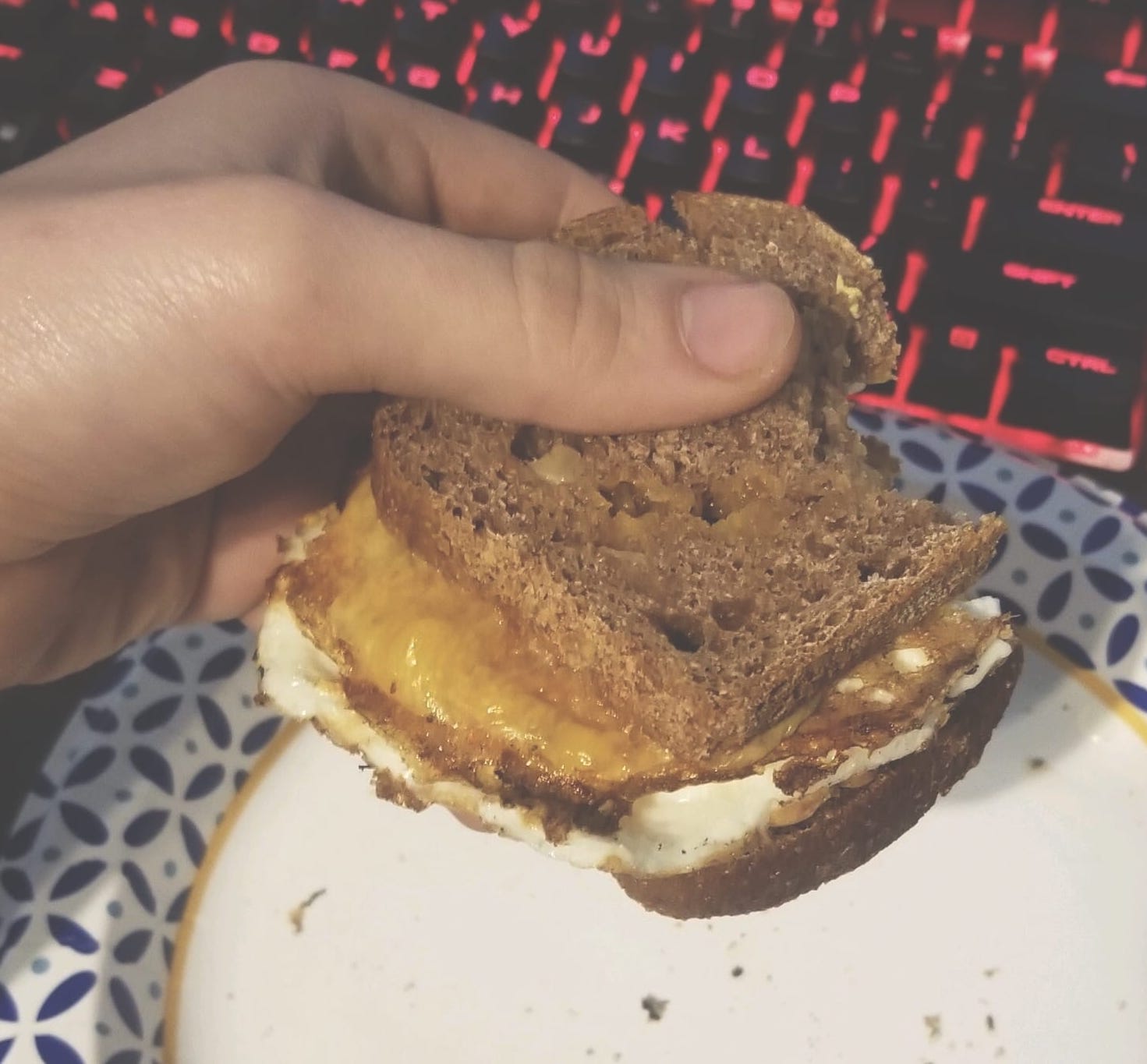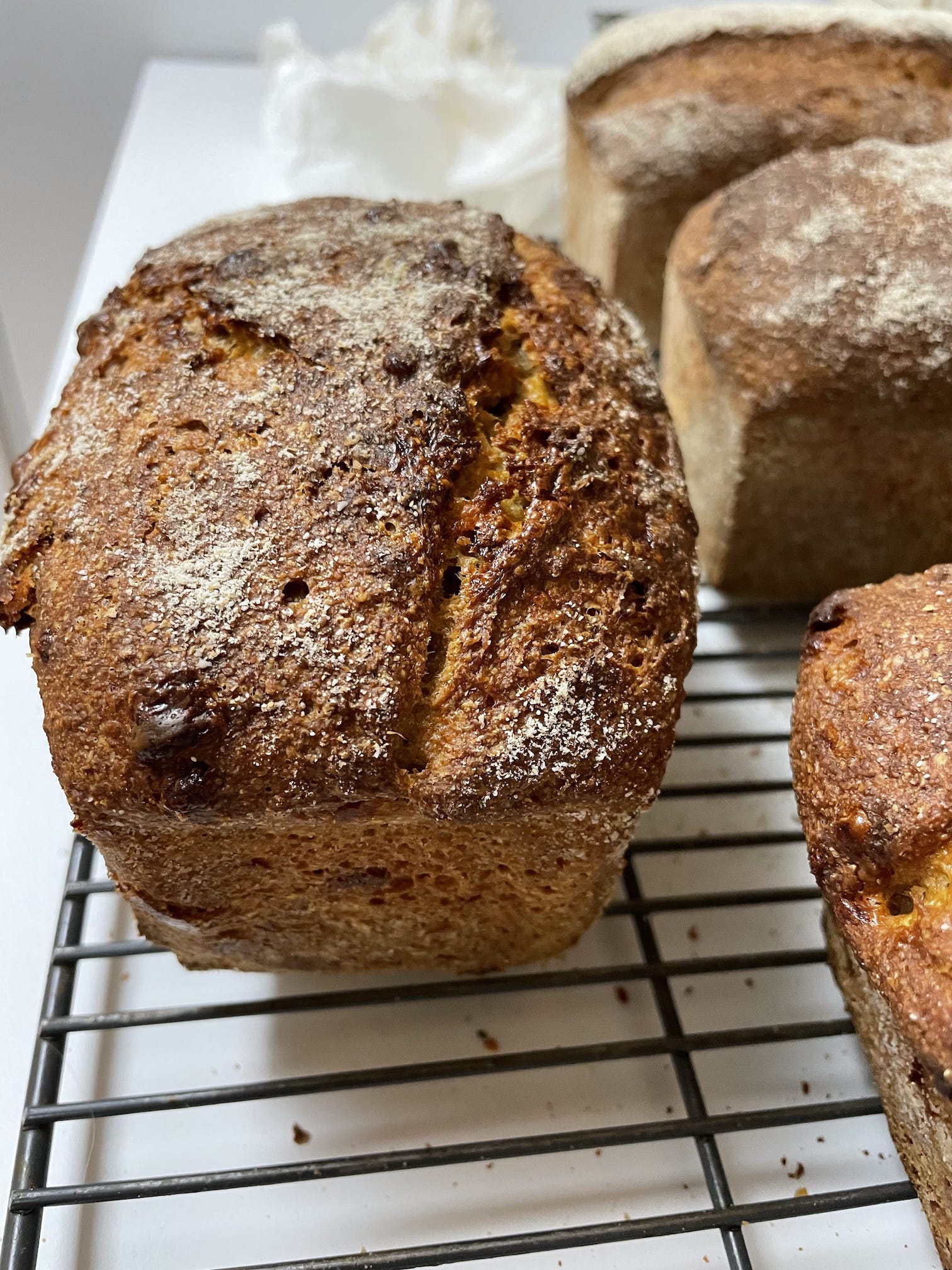Bread Rant
Advice for a Beginning Baker, from a Very Slightly More Advanced Baker

In my opinion, it’s helpful for a beginning baker to learn and follow a recipe, maybe two recipes, until you understand the steps and know what good bread dough looks and feels like. This is the important part - what does your good, healthy dough look and feel like at each step? Once you have that down in your bones, you can start to learn how to take whatever is in front of you, and to move it closer to your ideal image of that dough. That’s all that bread making is, learning how to see and feel your dough and then to keep it on the path to good bread, or to move it back to that path if it strays.
I mean, humans have been baking bread for at least 10,000 years! I guarantee you that the early bakers didn’t have A PERFECT METHOD, or even A PERFECT RECIPE that they followed!! There are a TON of methods and recipes available, and most of them work for the people who use them. Each baker will over time find/create a method that works for them, with their ingredients, their goals, and constraints.
To make the process even more “interesting”, each batch of wheat berries can vary wildly in how it mills, mixes and bakes. (The weather that year, the conditions during and after harvest, the storage process, there are lots of variables!) Like most of us, I learned this the hard way! My first emmer berries were lovely to work with. Then that supplier ran out and I bought from another (well respected) supplier. Those berries were a challenge to work with, much weaker gluten. They tasted great, but I had much denser bread for a while. Argh!
Stuff that helped me
Books and Articles
- Trevor J Wilson has some wonderful videos on Instagram (@trevorjaywilson) and I learned a LOT from his wonderful ebook:
Open Crumb Mastery.
It is WELL worth the price! - Mark Woodward's excellent blog post on Breadtopia.com
"Baking Bread with Low Gluten Wheat" - Chad Robertson, of Tartine Bakery fame
Bread Book: Ideas and Innovations from the Future of Grain, Flour, and Fermentation - Peter Reinhart is the KING of all things flour, as far as I'm concerned!
His books are ALL worth what I've paid for them and if you search for his name on your favorite podcast app, you'll find an incredible wealth of material!
Peter Reinhart's Whole Grain Breads: New Techniques, Extraordinary Flavor - Ken Forkish
Flour Water Salt Yeast
(look for his videos online also, really good) - Grain of Truth, by Stephen Yafa,
is a useful counter to the demonization of grain that is so popular right now.
-
Other excellent names to look for are:
- Adam Leonti
- Marc Vetri
- Vanessa Kimbell and her Sourdough School books.
Podcasts
- Seamus Blackley talks to Ologies host Alie Ward about Gastroegyptology and the history of bread in the Old Kingdom, Egypt. And about what happens when you attempt to revive 4500 year old yeast from ancient artifacts you found in museums.
- Modernist Cuisine founder Nathan Myhrvold and head chef Francisco Migoya talk about bread thru the centuries on the Modernist BreadCrumbs podcast.
- This is the podcast with Peter Reinhart and Vanessa Kimbell that got me interested in multigrain baking.
- This is another podcast about bread and dietary fiber that I found fascinating.
Online Videos and Classes
- The Artisan Baking Center is now offering online classes! A couple years ago I drove 500 miles to take Mike Zakowski's class on Whole Grain Breads and it was totally worth it!
I’ve got a ton of books and videos, but these are a good start.
Philosophy
I believe that people learn in different ways, I’ve experienced it myself. Find ways that work for you – books, videos, in-person classes… Whatever you can find that works! I think it’s much easier to learn bread when you’re working side-by-side with someone more experienced. Very few of us have that chance. I use books and podcasts and videos and I still had to take a full-day class taught by a professional sourdough baker before I really understood some things. And I am NOT an expert by any means, just an obsessed, geeky amateur. 🙂
I’m trying to find the exact books/videos that shaped my bread making practice, and for the life of me I can’t! But my approach basically is: I have these ingredients in front of me, this room temperature, this schedule happening in the next few days… What does my dough look and feel like right now, and what do I need to do to make it reach its peak at the time I want to bake? How fast is it developing right now, and do I need to speed it up or slow it down, or just watch and let it tell me when it’s ready? Do I want a sandwich bread or a wildly open crumb? Do I want more tension in the bread or less?
That last is more aspirational than anything, my dough handling DEFINITELY needs work. :-) But I’m not panicking over it because I learn with each loaf, I bake in a loaf pan, and I’m looking for a sandwich bread, not a wildly open crumb. So, I get better gradually and that’s OK.
And have fun making & eating good bread! That’s what it’s all about!

- All views expressed are my own opinions, based solely on my own research and experience. I am not a professional baker. Nothing in this blog is professional nutritional or medical advice. I do not include affiliate links, I am not compensated for any links or recommendations on this blog.